Given what happened last night, things are likely to fundamentally change for how bicycle advocates nationwide frame their arguments from here on out. But just what exactly does this all mean for bicycling? I asked leaders from several major bike advocacy groups what they thought and I think you’ll be scared, surprised, and inspired by what they said. From taking a cue from the Tea Party, to a frank assessment of what could be a bumpy bikeway ahead, read their reactions below…
Kevin Mills, Vice President of Policy for the Rails to Trails Conservancy:
Will bicycling be impacted by the shift in power?
“Bicycling is not traditionally a partisan issue, so it’s unfortunate that there have been some occasions where bicycling has been used as an issue to divide rather than unite. However, we take heart in our support from across the political spectrum in communities across the country…”
Is the Transportation Enhancements program in jeopardy?
“The Bureau of National Affairs recently reported that Rep. Mica may take transportation funding ‘back to basics’ and that Transportation Enhancements may be among the programs cut. However, Mr. Mica has vocal constituents and political allies back home for whom trail systems and bicycling are high priorities. He has expressed support for trails and participated in ribbon cuttings on numerous occasions, and he supports robust transportation spending overall. If there is an attack, it is likely to stem from House leaders directing committee chairs to push for aggressive cuts in programs that they do not perceive as core federal functions.
On the role for bike advocates going forward:
“It is critical that bicycling advocates make the case for the cost-effectiveness and mainstream importance of federal active transportation investments. We need to convince decision-makers on both sides of the aisle that investment in bicycling and walking is more important in times of fiscal constraint, not less. That is why Rails-to-Trails Conservancy feels so strongly that AAA’s call for restricting the use of federal gas taxes for highways alone has to be challenged (see our petition). When money is tight, balanced transportation investments are more important than ever. Our past gains and future needs could be in jeopardy if we don’t convince decision-makers of this truth.”
Tim Blumenthal, Director of the Bikes Belong Coalition
“I think emphasizing the cost effectiveness of government investments is going to be absolutely crucial. I think there’s a perception among some elected officials that bicycling is an enhancement or an add-on, that it’s a nice thing and you do it when budgets are flush and everything else is taken care of; but we know from experience – especially in Portland – that a small amount of money invested in bike infrastructure gives people a viable alternative to driving, saves cities on infrastructure construction cost, saves money on new parking construction and all the other benefits we stack up all the time.
What I’ve been hearing from the new majority is talk about any infrastructure investments being focused on building new lanes on highways. In some cases that makes sense… but we’ll have to really sharpen our arguments about dollar invested/dollar returned. If this election was all about people saying ‘we want smaller, more efficient government’ than bicycling should be a higher priority.
The other thing is we have to be clearly more bike-partisan than ever. We’ve got to be very careful out of the gate not to be branded as a Democrat thing or a solution that’s supported by just one party — if we did that we’d lose half the population out of the gate.
We have two choices now as a movement: One is to be discouraged and say the sky is falling, the other is to get back to work and get better, and that’s what we’re going to do.”
Jim Sayer, Executive Director, Adventure Cycling

Jim Oberstar was a key champion for your U.S. Bike Route System project. What are your thoughts after his defeat?
“It’s shocking. It’s stunning really. In general it’s a tremendous loss for America to not have Jim Oberstar working on transportation. He was a champion not just for us [bikes] but for a truly integrated transportation system. To not to have Oberstar’s leadership on the US Bike Route System is a setback; but the project now has 27 states working on projects, which is far beyond anything we expected.
To some extent, the work we’ve all done has spread projects far and wide and has generated interest at state and local levels that I think will help move the bike movement forward. I think it’s early to say what impact the elections will have… but I do think we have an incredible ecosystem of organizations and people that will help keep the bike movement going forward no matter who’s in power in D.C.”
What about working in a bi-partisan fashion?
“I hope we can bring both parties around on this issue. There’s got to be some incentive for both Republicans and Democrats to have an issue they can work together on, an issue they can work on where they haven’t already had harsh words. Bicycling and transportation could be one of them. You have all these groups – the Chamber of Commerce, labor, transit, and so on, all saying we need a long term investment plan for transportation, so it seems there’s more pressure to act here than in other areas. How that plays out for biking, who knows.”
Andy Clarke, President of the League of American Bicyclists
“We are going to be playing a lot of defense in the months ahead and – not to push the analogy too far – we lost a star player in yesterday’s elections: Congressman Jim Oberstar.
The bicycling movement has to hone our message, get back to basics, and start working with a lot of new members of Congress to make sure they know about our issues. Thanks to our successes over the past several years we have a lot more to lose now… so it’s going to be more important than ever for folks to show up in Washington at the National Bike Summit in March and to meet with their elected representatives at home to make the case for continuing the Federal investment sustainable, livable, healthy communities. Bicycle-friendly communities.”
Rob Sadowsky, Executive Director of the Bicycle Transportation Alliance, former ED of the Active Transportation Alliance in Chicago and Board Member of the League of American Bicyclists and the Alliance for Biking and Walking.
On the loss of House control:
“There’s going to be a lot of fears with Oberstar’s departure. There will be a little battle over positions, but locally we might gain as DeFazio could gain stature in the Transportation and Infrastructure Committee and become the ranking minority member.
The biggest concern with House shift is the Republicans have almost across the board taken a pledge to not fund projects through earmarks. While earmark funding on surface appears to be a poor way of managing a democracy, our projects, particularly trail projects have historically done very well through earmarks.
In order for us to convert to a transportation policy truly abased on merit, we need a reform of the transportation bill, and with a split congress it will be difficult to get reform inside that bill (like a complete streets policy for example). We may not do as well in project funding in the future.
On other hand, we had two years to build a great transportation bill and we didn’t get that done either… so maybe sitting down around a table trying to build consensus with two parties is what it’s going to take to get incremental changes now that will help build for the future.”
So, why do you think we didn’t get that done?
“I think one thing we saw last night was a lack of vision. If you look at what’s going on right now, there’s a lot of vision coming from the White House and the DOT. Some Democrats embraced that, but as a party, maybe this will get them to embrace a real vision of hope and livability and not be afraid to run on that campaign.
One thing the Tea Party movement shows us is that yes, fear and loathing can trump hope and vision, but it also shows that people with very little experience – and in some cases very little money – can build a campaign and win. The lesson we can take from this is we need to find our own candidates. We need to show up at town halls and be just as angry and loud, but instead of being loud about fear, we need to be loud about traffic justice, street design, connectivity…
We need to not be complacent, we need to say ‘This is our country!’ We need to not sit around.”
Some important takeaways from some very smart people.
There’s a lot of great reporting about what the election means for national transportation policy. Two of the best I’ve come across are from Streetsblog and from The Transport Politic. Once local results are final, I’ll have more reactions to share about this election’s regional and statewide impacts on bicycling and active transportation.



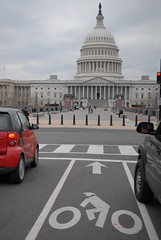


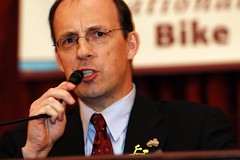
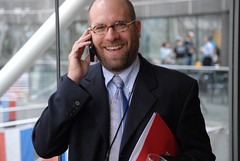
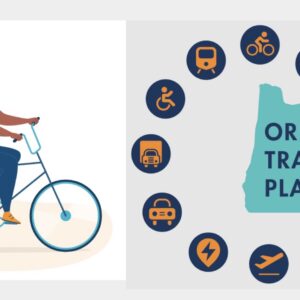
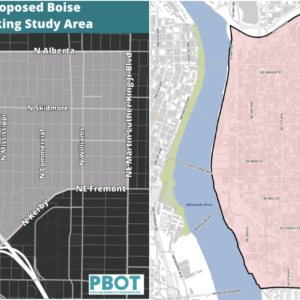
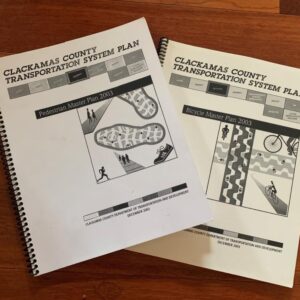

Thanks for reading.
BikePortland has served this community with independent community journalism since 2005. We rely on subscriptions from readers like you to survive. Your financial support is vital in keeping this valuable resource alive and well.
Please subscribe today to strengthen and expand our work.
Whole lotta noise. I really doubt it matters if you vote for a donkey or an ephalump that determines how much bike lanes get built in our bikey-city.
Suits in DC probably have never even heard of stumptown.
It seems to me that it is time for a little more outreach to “the enemy”. It is now a fact that the House will be a consertvative body so the tactic of attacking non-believers won’t be very effective. More diplomacy and less shouting is the way to move the argument forward.
Hmmm, let’s see how long it takes until someone trashes this idea or me personally.
Whatever Eyeore wants, Eyeore gets. 😛
Really – diplomacy’s great. The problem is when you have folks refusing to engage in it. Thus far, there have been quite a few soundbites suggesting that pragmatic compromise is off the table. Couple this with the vastness of the automobile and oil industry lobby and things look far from promising.
I’d say the real trick right now is holding on to what we’ve got and avoiding sharp cuts to relevant allocation/funding issues.
Rob, As a tea party supporter its become stale hearing the ilks like you calling me things such as a fear monger, racists, and the like. Fiscal responsibility and smaller government is the foundation of the movement. If you would like a MUP simply come up with a reasonable plan that pays for it and I think we all can support it. Your limitless appetite for spending is the problem.
I’m going out on a limb here, but this probably will not affect my bike rides.
Why is no one arguing for more local control? Since the Eisenhower administration, the lion’s share of transportation funding has been federalized, and therefore the shape it takes dependent upon which way the winds are blowing in D.C. How about a little more local control and local funding? How about D.C. sucking up less money and then spitting it back out via whatever Congresscritters are the sneakiest or make the best sweetheart deals or what-have-you?
I’m a little disappointed in Sadowsky’s perspective, that the potential downfall of earmarks is a bad thing. It’s the earmark system that is a bad thing, and maybe if he wasn’t so eager to tarnish the Tea Partiers with the “fear and loathing” he could consider that more transparency and a better, merit-based system for allocating tax dollars could be a very good thing. I certainly understand the tendency to write off the whole of an off-the-wall political movement as a bunch of crazies, but I think we do that at our own peril and we do a disservice to some elements of what is mostly (sometimes accurately, sometimes not) referred to as the Tea Party. Every exit poll and every poll I’ve read about for months indicates that people are, on the whole, fed up with both political parties and fed up with a system that relies on crony-ism, back-room dealing, and pork to accomplish anything — everyone, I guess, except Sadowsky and his fellow transportation advocates, who just seem to want the gravy train to keep coming. Maybe it’s time they catch up to the electorate.
Remember to send communication to DeFazio to “KEEP IT SIMPLE” and remind him that a minimum of 1%, by last census, of all shopping and work commutes are done BY BICYCLE, and therefore the next transportation bill, by anyone’s standard needs to have at least 1% of all $ spent on bicycle-related infrastructure, education, etc. Federally-funded bicycle monies do NOT have to come from earmarks, but could very well be built into the overall transportation bill, and funded yearly. It is HIGH TIME that the US, as does every other country in the entire world, begins to see bicycles as a low-cost, low impact, “best bang for the buck” form of transportation and not just sport or “just a kid thing”!
@sprocket: Why not disburse road funds proportionate to use? That would be real fiscal responsibility.
GoP wasted last half a term making Dem’s looking bad, be ready for next half.
A star will rise in the next few years in DC.
you may be surprised.
Still think Pres should give an accounting for the record of every block made to his efforts.
Excellent post, Jonathan. Cost-effectiveness, transportation balance, freedom, oil independence. The conservative merits are there. This year’s Bike Summit will be really interesting. Lots to talk about.
And remember, conservatives, Tea Partiers, whatever you call yourselves–every American who uses a bicycle for transportation is keeping their American dollars out of the filthy hands of Islamofascist oil drillers! Driving is treason–spread the word!
Send money to Washington to have it skimmed, then passed out 2000 miles away to build cycling infrastructure? Thanks, I’ll take limited federal government and local control.
Of course, the ones that really loose out under this process are leaders of national advocacy movements.
I’m going for a ride on my bike today … just like I do everyday, and will continue to do. The rest is just………………………….
We need to get Rush Limbaugh, Sean Hannity,Glenn Beck, Bill O’Reilly and Sarah Palin to take up bicycling.
Mike Savage is a bike rider. It’s like I said before, liberals don’t own bicycling.
George Bush is an avid cyclist but many here still hate him! Go figure.
I think we got into this mess because we spent far too much time with the people in power, who were relatively friendly to the message of bicycling, and not nearly enough time working with those who didn’t. We helped create yet another polarizing issue splitting the parties apart, and when some of us head to DC for the annual Bike Summit in March, our presence may serve to remind conservatives of what to place on the chopping block (while otherwise we might have gone un-noticed as a rounding error in the massive federal budged).
But there is an upside, since we now have a split between the House & Senate. For anything to get done, the Democrats & Republicans are going to have to work together, and what we accomplish in that environment is likely to survive changes in administrations and party power. No more of the party that “lost” doing what they can to stall legislation and, when the time comes, reversing it. That’s my hope anyway. –Mike–
Despite the conciliatory statements by your interviewees, many of them are long overdue in realizing that bicycling should not be a partisan issue. These people have long framed support for bicycling as a pork-project spending fest. Look at Clarke’s statements. Clarke is the most tax-and-spend of the bunch, and he said “We are going to be playing a lot of defense.”
Well, of course, when spending federal money is the only trick in your playbook.
That is a stupid playbook. As Jim said, liberals don’t own bicycling. My bicycling buddies are all over the map politically.
Former Republican governors Christie Todd Whitman (New Jersey) and Tom Ridge (Pennsylvania) were avid supporters of bicycling. Ridge, who I know more about, supported vehicle code reform, better roads, official endorsement/encouragement, integrating knowledge of bicycling into law enforcement, bike racks on transit buses, and many more issues. Ridge personally endorsed BicyclePA’s 2,000 miles of signed bicycle touring routes, one of several state systems which form a prototype of the U.S. Bike Route System (and which is almost cost-free, requiring only committee meetings and signposts).
I’ll take the support Ridge gave bicycling over pork any day.
Rob Sadowsky, PLEASE do not make this a partisan issue. Bicycle travel helps everyone, liberal or conservative. I don’t like being labeled a fear mongerer for being a tea-party voter! Earmarking was a dirty process, the ends don’t justify the means. We can get bicycle infastructure going on it’s own merits, I will be writing my new congresswoman for this support!